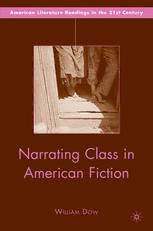
Narrating Class in American Fiction PDF
Preview Narrating Class in American Fiction
American Literature Readings in the st Century Series Editor: Linda Wagner-Martin American Literature Readings in the 21st Century publishes works by contemporary critics that help shape critical opinion regarding literature of the nineteenth and twentieth century in the United States. Published by Palgrave Macmillan: Freak Shows in Modern American Imagination: Constructing the Damaged Body from Willa Cather to Truman Capote By Thomas Fahy Arab American Literary Fictions, Cultures, and Politics By Steven Salaita Women & Race in Contemporary U.S. Writing: From Faulkner to Morrison By Kelly Lynch Reames American Political Poetry in the 21st Century By Michael Dowdy Science and Technology in the Age of Hawthorne, Melville, Twain, and James: Thinking and Writing Electricity By Sam Halliday F. Scott Fitzgerald’s Racial Angles and the Business of Literary Greatness By Michael Nowlin Sex, Race, and Family in Contemporary American Short Stories By Melissa Bostrom Democracy in Contemporary U.S. Women’s Poetry By Nicky Marsh James Merrill and W.H. Auden: Homosexuality and Poetic Influence By Piotr K. Gwiazda Contemporary U.S. Latino/a Literary Criticism Edited by Lyn Di Iorio Sandín and Richard Perez The Hero in Contemporary American Fiction: The Works of Saul Bellow and Don DeLillo By Stephanie S. Halldorson Race and Identity in Hemingway’s Fiction By Amy L. Strong Edith Wharton and the Conversations of Literary Modernism By Jennifer Haytock The Anti-Hero in the American Novel: From Joseph Heller to Kurt Vonnegut By David Simmons Indians, Environment, and Identity on the Borders of American Literature: From Faulkner and Morrison to Walker and Silko By Lindsey Claire Smith The American Landscape in the Poetry of Frost, Bishop, and Ashbery: The House Abandoned By Marit J. MacArthur Narrating Class in American Fiction By William Dow Narrating Class in American Fiction William Dow NARRATING CLASS IN AMERICAN FICTION Copyright © William Dow, 2009. Softcover reprint of the hardcover 1st edition 2009 978-0-230-60982-2 All rights reserved. First published in 2009 by PALGRAVE MACMILLAN® in the United States—a division of St. Martin’s Press LLC, 175 Fifth Avenue, New York, NY 10010. Where this book is distributed in the UK, Europe and the rest of the world, this is by Palgrave Macmillan, a division of Macmillan Publishers Limited, registered in England, company number 785998, of Houndmills, Basingstoke, Hampshire RG21 6XS. Palgrave Macmillan is the global academic imprint of the above companies and has companies and representatives throughout the world. Palgrave® and Macmillan® are registered trademarks in the United States, the United Kingdom, Europe and other countries. ISBN 978-1-349-37627-8 ISBN 978-0-230-61796-4 (eBook) DOI 10.1057/9780230617964 Library of Congress Cataloging-in-Publication Data Dow, William. Narrating class in American fi ction / William Dow. p. cm.—(American literature readings in the twenty-fi rst century) 1. American fi ction—19th century—History and criticism. 2. Social classes in literature. 3. American fi ction—20th century—History and criticism. 4. Working class in literature. I. Title. PS374.S68D69 2009 813(cid:2).309355—dc22 2008017506 A catalogue record of the book is available from the British Library. Design by Newgen Imaging Systems (P) Ltd., Chennai, India. First edition: January 2009 10 9 8 7 6 5 4 3 2 1 For my father, my mother, and Anne-Marie This page intentionally left blank Contents Acknowledgments ix Introduction: The Case of Class 1 1 Whitman’s 1855 Leaves of Grass: “Hard Work and Blood” 17 2 Class and the Performative in Rebecca Harding Davis’s Life in the Iron Mills, and Stephen Crane’s Maggie 45 3 Body Tramping, Class, and Masculine Extremes: Jack London’s The People of the Abyss 75 4 “Always Your Heart”: Class Designs in Jean Toomer’s Cane 105 5 Meridel Le Sueur’s Salute to Spring: “A Movement Up Which All Are Moving” 133 6 Class, Work, and New Races: Zora Neale Hurston’s Their Eyes Were Watching God and Agnes Smedley’s Daughter of Earth 163 7 Class “Truths” in James Agee’s Let Us Now Praise Famous Men 187 Conclusion: Going Back to Class 219 Notes 225 Works Cited 247 Index 263 This page intentionally left blank Acknowledgments This book has been a long time in the making. Among the many friends and colleagues who have given extraordinary insight and encouragement to this project, I would like to offer a special thanks to Alan Wald, Karin Badt, Robert Shulman, Jon Delogu, Linda Wagner-Martin, Paula Rabinowitz, David Coad, Jeanne Campbell Reesman, John Hartsock, and Barbara Foley. The research for this book was substantially aided by several American University of Paris librarians. Thanks to Jorge Sosa, Isabelle Dupuy-Llorente, Anne Guerineau, Michael Stoepel, Sally Murray, Laurence Amoureux, and Jeff Gima. Portions of chapter 2 appeared in Twisted from the Ordinary: Essays on American Literary Naturalism, ed. Mary Papke (Knoxville: University of Tennessee Press, 2003). Sections of chapter 3 were first published as “Down and Out in London and Orwell,” Symbiosis 6. 1 (April 2002). An early version of chapter 4 was first published as “The ‘Great Design’ of Toomer’s Cane” in MELUS: The Journal of the Society for the Study of the Multi-Ethnic Literature of the United States, and is reprinted here with the permission of MELUS. I’m grateful to the editors and readers of these publications.
